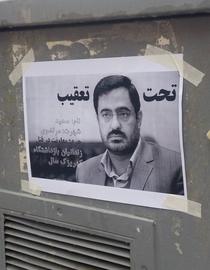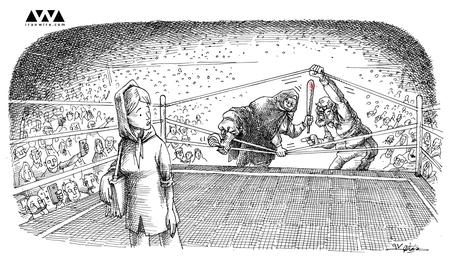Former Tehran Prosecutor Said Mortazavi has been jailed a year and a half after an appeals court upheld a sentence against him.
On the morning of Sunday, April 22 the Justice Department in the northern province of Mazandaran announced that he had been arrested. Following claims that authorities could not find him, the Iranian judiciary’s Mizan News Agency reported that police identified that Mortazavi was staying in a villa in the province and arrested him there. That afternoon they transferred him to Evin Prison in Tehran so he could begin serving his two-year sentence.
On the morning of April 21, Iran's minister of justice Alireza Avaei dismissed local reports that the Tehran prosecutor — known as the “Butcher of the Press” — had been arrested in Rey, south of Tehran and sent to jail. The Ensaf News website had reported that Mortazavi was already in jail.
On November 26, 2016, Branch 22 of the appeals court in Tehran upheld a verdict that Saeed Mortazavi should spend two years in prison. But, despite efforts by the plaintiffs who brought the case against him, the sentence was never carried out. In mid-April, judiciary spokesman Gholam Hossein Mohseni Ejei claimed that judicial authorities were unable to carry out the sentence because Saeed Mortazavi was missing, prompting members of the public to hang up posters featuring Mortazavi’s face alongside the words “Wanted” around the capital Tehran and other cities. People were angry, and clearly wanted Mortazavi to be found and sent to prison.
During his trial, Montazeri appeared in court with a bodyguard and was arrogant in his behavior. He demonstrated little respect for the law and made attempts to show that he still had strong supporters within the regime, particularly among politicians and security officials.
The list of Mortazavi’s human rights violations is long. He was handed down a sentence specifically for his role in the death of Mohsen Rouhalamini, who was arrested during demonstrations following the disputed 2009 presidential election and died at Kahrizak Detention Center as a result of torture. At the time, Mortazavi was Tehran’s prosecutor. Ignoring objections from police officials, he sent the arrested protesters to Kahrizak Detention Center near Tehran, which had been reserved for violent and dangerous criminals.
Not Equal before the Law
The family of Rouhalamini filed a legal complaint against Mortazavi, and so did the family of Mohammad Kamrani, another victim of torture at Kahrizak. However, Mortazavi was acquitted and found not guilty of complicity in Kamrani's death. But there was a difference in the stories of the two victims. Mohsen Rouhalamini was the son of Abdolhossein Rouhalamini, an influential principlist conservative politician and the secretary general of the conservative Development and Justice Party of Islamic Iran. He has close links with key conservative figures including Mohsen Rezaei, secretary of the Expediency Council and a presidential candidate in 2013.
Following the death of his son, Abdolhossein Rouhalamini persevered in his pursuit of justice for eight years, resulting in the two-year prison sentence for Mortazavi. The sentence, according to Rouhalamini’s family, was too lenient but considering Mortazavi’s record and his connections in the regime, it was a surprise that he was sentenced at all.
Saeed Mortazavi has played important roles at four junctures in the history of the Islamic Republic. He was a judge between 1998 and 2001, and was instrumental in shutting down the reformist press. He sent many journalists to prison, and it was during this period that he was given the grim nickname “the Butcher of the Press.” Journalists who were imprisoned at the time have written extensively about how they were inhumanely treated, the gross violations of their human rights and the humiliation they endured. Despite western countries blacklisting Mortazavi for human rights abuses, for at least 10 years he has remained a trusted figure of the regime and continued arresting critics and opponents of the Islamic Republic.
Fake News
The second time Mortazavi’s name made the news was in July 2003, when the Iranian-Canadian photographer Zahra Kazemi died in custody at Evin Prison. The incident occurred under suspicious and unexplained circumstances and Mortazavi was implicated and accused of being responsible for her death. He insisted that Kazemi was a spy, but early in 2018, Ali Younesi, a former Iranian intelligence minister in office when Kazemi died, revealed new details about her death and said that his ministry had concluded that Mortazavi’s claim about espionage had been false. Nevertheless, Mortazavi escaped prosecution or any repercussions by issuing false news about Kazemi, and with the assumption that the Iranian judiciary had no interest in the truth.
Following widespread demonstrations in the aftermath of the 2009 presidential election, Mortazavi once again played a prominent role in arresting both political figures and ordinary citizens. A number of detainees died in jail. News of his arrest meant that he would now be serving two years in prison for one of those deaths — but only for one of them — although the minister of justice's denial that he has been arrested sparked fears that Mortazavi might not even have to serve two years.
Mortazavi was also infamously linked to another scandal during the presidency of Mahmoud Ahmadinejad. From 2012 to 2013, he was the head of the Social Security Fund, an important section of the Ministry of Labor and Welfare. During that time, Mortazavi tried to enter into deals with Babak Zanjani, the sanction-breaking billionaire who is currently in prison awaiting a death sentence. Mortazavi’s intention was to sell most of the profitable companies belonging to the fund to Babak Zanjani, a corrupt deal that ended abruptly when Zanjani was arrested.
Prior to Zanjani’s arrest, Fazel Larijani, brother of both judiciary chief Sadegh Larijani and Parliament Speaker Ali Larijani, visited Mortazavi and suggested he go into partnership with him in exchange for a percentage of the proceeds. Unbeknownst to Larijani, Mortazavi secretly recorded their conversation. He then gave the recording to Ahmadinejad, who played it back in parliament on February 3, 2013.
Two days after the audio file was released, the judiciary arrested Saeed Mortazavi. He was in custody for one day only, but he had lost the support of the judiciary. There can be little doubt that the anger of judicial officials — and especially that of Sadegh Larijani — played an important role in ensuring Mortazavi was finally sentenced.
"Don't take your eyes off the CCTV"
After the initial reports that Saeed Mortazavi had been arrested, Hesamodin Ashna, an advisor to President Rouhani, tweeted: “He is neither Saeed Emami nor Seyed-Emami. He neither needs hair remover nor does he hang his shirt. Please tell the monitoring guard not to take his eyes off the CCTV, even for a moment.”
Saeed Emami was the deputy minister of intelligence accused of organizing the “Chain Murders,” the series of assassinations of dissidents that went on between 1988 and 1998. He reportedly committed suicide in prison by swallowing hair remover, but many hardliners who supported him believed that he was murdered to cover up the truth about others involved in the assassinations.
Kavous Seyed Emami was a prominent environmentalist arrested on January 24, 2018 on charges of espionage. On February 9, his family was informed that he had committed suicide in prison. The family considers his death to be suspicious and his son has called for an independent investigation.
It is unlikely that Saeed Mortazavi will meet the same fate as Saeed Emami or Seyed-Emami. Without a doubt, many of his victims and people who are familiar with his record and who know about his brutal violations of human rights will be happy to hear confirmation that he has been arrested. But he still has many supporters in the Islamic Republic’s security establishment, and they will make sure that his two years in prison will not be too hard on him.
Prison could put an end to Mortazavi’s public life in politics and the judiciary but, for both the public and for his victims, his case will remain open — and two years in a friendly prison will not close it.
More on Saeed Mortazavi:
Former Intelligence Minister: “We knew Zahra Kazemi was no Spy”, February 2018
135 Lashes for Disgraced Prosecutor Saeed Mortazavi, November 2016
The Butcher of the Press is Disbarred, December 2014
Mortazavi: Fall Guy for the Regime, December 2014
Saeed Mortazavi Arrives in Court, September 2014
visit the accountability section
In this section of Iran Wire, you can contact the officials and launch your campaign for various problems

























comments